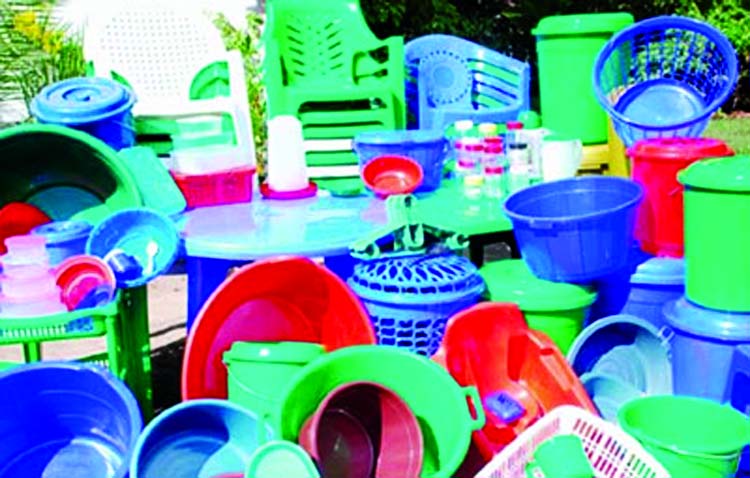
Abu Sazzad :
The export earning from plastic sector declined by 15.13 per cent in the first two months (July – August) of the current fiscal 2015-16 compared with corresponding period of the last fiscal 2014-15.
The said sector earned $ 14.58 million in the first two months of the current fiscal compared with $ 17.18 million compared with last fiscal’s first two months, according the latest data of EPB released on Tuesday.
The EPB data shows that PVC Bags earned $5.85 million, followed by $3.43 million from plastic waste and $5.30 million from other products.
The government set the export target at $118 million for the plastic sector in the ongoing fiscal. Country’s export earning was $100.57 million in the last fiscal from the said sector.
Md Jashim Uddin, President of Bangladesh Plastic Goods Manufacturers and Exporters Association said told the New Nation that plastic products contribute 1.20 per cent of the country’s GDP. At present, a total of 23 countries in North America, Europe, Asia and the Pacific and the Middle East are the major export destination of plastic products.
But, the export-oriented plastic sector does not enjoy similar kinds of facilities as enjoyed by other major export-oriented products. Plastic exporters unlike garment exporters do not receive any additional incentives and benefits, he claimed.
He demanded bank loan for the export oriented plastic industries at lower rate of interest and cash incentives.
CPD Additional Research Director Dr Khondaker Golam Moazzem said, country’s plastic sector faces multifarious difficulties. Absence of modern equipment and machinery in manufacturing facilities puts the country at a disadvantage situation. Without investing on high-tech machines, Bangladesh would not be able to take advantage of low cost production unlike China and India.
“Actually, we do not have any testing laboratory to test quality and strength of plastic goods. A plastic testing laboratory and testing centre are urgently needed”, said the CPD research director.
At present, the industry suffers due to shortage of skilled workers especially in the small and medium sized enterprises. Most of the enterprises hire untrained workers, he said.
On the other hand, the industry suffers due to shortages of electricity and gas supply and lack of access to capital. Moreover, shipment cost is high and such transportation costs put the local products in pressure in the global market. The plastic sector is partly affected due to withdrawal of the GSP in the US market owing to non-compliance of the garments and shrimp sectors.
Local and foreign investment are needed for boosting the sector, he also said.
The export earning from plastic sector declined by 15.13 per cent in the first two months (July – August) of the current fiscal 2015-16 compared with corresponding period of the last fiscal 2014-15.
The said sector earned $ 14.58 million in the first two months of the current fiscal compared with $ 17.18 million compared with last fiscal’s first two months, according the latest data of EPB released on Tuesday.
The EPB data shows that PVC Bags earned $5.85 million, followed by $3.43 million from plastic waste and $5.30 million from other products.
The government set the export target at $118 million for the plastic sector in the ongoing fiscal. Country’s export earning was $100.57 million in the last fiscal from the said sector.
Md Jashim Uddin, President of Bangladesh Plastic Goods Manufacturers and Exporters Association said told the New Nation that plastic products contribute 1.20 per cent of the country’s GDP. At present, a total of 23 countries in North America, Europe, Asia and the Pacific and the Middle East are the major export destination of plastic products.
But, the export-oriented plastic sector does not enjoy similar kinds of facilities as enjoyed by other major export-oriented products. Plastic exporters unlike garment exporters do not receive any additional incentives and benefits, he claimed.
He demanded bank loan for the export oriented plastic industries at lower rate of interest and cash incentives.
CPD Additional Research Director Dr Khondaker Golam Moazzem said, country’s plastic sector faces multifarious difficulties. Absence of modern equipment and machinery in manufacturing facilities puts the country at a disadvantage situation. Without investing on high-tech machines, Bangladesh would not be able to take advantage of low cost production unlike China and India.
“Actually, we do not have any testing laboratory to test quality and strength of plastic goods. A plastic testing laboratory and testing centre are urgently needed”, said the CPD research director.
At present, the industry suffers due to shortage of skilled workers especially in the small and medium sized enterprises. Most of the enterprises hire untrained workers, he said.
On the other hand, the industry suffers due to shortages of electricity and gas supply and lack of access to capital. Moreover, shipment cost is high and such transportation costs put the local products in pressure in the global market. The plastic sector is partly affected due to withdrawal of the GSP in the US market owing to non-compliance of the garments and shrimp sectors.
Local and foreign investment are needed for boosting the sector, he also said.

